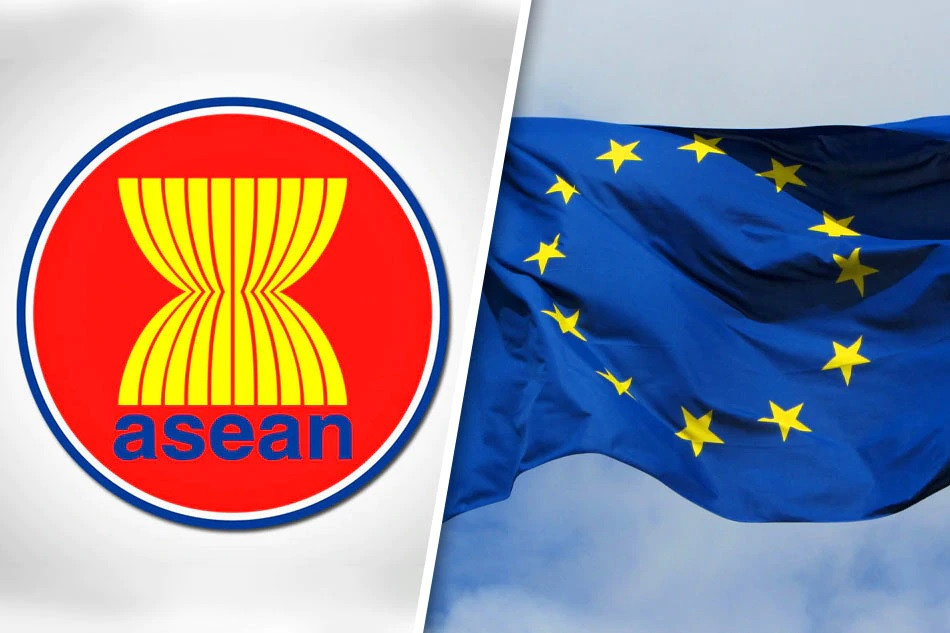Popular Reads
Top Results
Can't find what you're looking for?
View all search resultsPopular Reads
Top Results
Can't find what you're looking for?
View all search resultsJokowi sticks up for palm oil, nickel policy at EU-ASEAN summit
“There can no longer be one side that always dictates to the other and assumes that ‘my standard is better than yours,’” President Jokowi said at the EU-ASEAN Summit.
Change text size
Gift Premium Articles
to Anyone
P
resident Joko “Jokowi” Widodo has taken a more outspoken stance against the European Union’s efforts to impose its own sustainability standards on trade with ASEAN, insisting at a summit on Wednesday that it would have to treat the bloc as an equal if it wanted to build a better partnership.
His remarks, delivered at a special EU-ASEAN Summit to celebrate 45 years of their dialogue partnership, comes amid disagreements over EU environmental and trade policies, as well as efforts to conclude a trade deal that has languished for 15 years.
Southeast Asia, Jokowi said, had become a world economic powerhouse and so a partnership with ASEAN would benefit the EU. But going forward, he asserted, Europe would have to let ASEAN nations to do what was necessary to develop their own economies.
“We have worked through many challenges together. Our partnership has also achieved many good outcomes. But I must acknowledge that it is not all smooth sailing,” he said at the EU headquarters in Brussels.
“Partnerships must be based on equality. There must be no coercion. There can no longer be one side that always dictates to the other and assumes that ‘my standard is better than yours,’” the President continued.
His comments alluded the EU’s sustainability standards for imports, which critics say put disproportionate pressure on developing nations.
In the long run, the EU is seeking to significantly reduce its use of palm oil, Indonesia’s largest export commodity, over the product’s connection to deforestation.
The response from Brussels was muted.
“The EU and ASEAN [...] understand each other very well,” said European Council President Charles Michel said in his remarks at the summit. “We share the same values and the same spirit of cooperation. We both know the challenges of transforming the vision of a political community anchored in common interests and common rules.”
Removing obstacles
Citing an EU-ASEAN Business Council survey published in September, Jokowi noted ASEAN’s growing influence, with 63 percent of respondents perceiving the region as having the world’s best economic opportunities.
In the same survey, 97 percent of respondents expressed their wish for the EU to speed up the EU-ASEAN free trade agreement. The agreement, which is a long-term objective for both sides, seeks to dismantle trade barriers between two of the world’s largest economic regions and unify a combined market of more than 1 billion people.
Data cited by the government shows the value of EU-ASEAN trade in 2021 amounted to US$268.9 billion.
However, obstacles still stand in the way of the deal, including a new EU anti-deforestation law that will challenge Indonesia and Malaysia’s palm oil sectors.
The legislation, agreed upon last week, will require firms supplying palm oil, cattle, soy, coffee, cocoa, timber and rubber – as well as some derivative products such as beef and furniture – to the EU market to prove their supply chains are not fueling the destruction of forests.
As the leader of incoming ASEAN chair Indonesia, Jokowi expressed his disapproval of the policy, which imposes fines for non-compliance. With Indonesia’s agriculture industry unprepared to make the jump to strict EU sustainability standards, he said the law’s inflexible approach would hurt the nation’s development.
In a joint statement, the two sides agreed to convene the first EU-ASEAN Ministerial Dialogue on Climate Change next year, as well explore “further cooperation to reduce deforestation”.
Michel also reaffirmed the EU’s commitment to expediting the free trade agreement, saying it would be a “powerful tool for promoting growth and closer ties” despite the ongoing challenges.
Making a case
Jokowi’s trip to Brussels also coincides with an ongoing trade dispute between Indonesia and the EU at the World Trade Organization (WTO), which last month ruled against Jakarta’s policy of exporting only processed nickel.
With Jakarta moving to appeal the WTO ruling, Jokowi reiterated the government’s stance at the Brussels summit.
“Indonesia wants to emphasize that inclusive, value-added development will justly support the security of the global economy. Within this context, Indonesia will continue to build its downstream industry,” he asserted.
With 21 million tonnes in nickel reserves, Indonesia is among the world’s top producers of the ore. But experts doubt the summit will have any quick effect on the WTO and deforestation debates.










